[Trigger warning: This article mentions mental health struggles.]
“C13!”
Somewhere in the deeper pits (a.k.a. just last year) of my phone’s gallery, an unidentified person faintly screams the name of the leader—and main rapper—of VXON. In the short clip, C13 (read as “C one three”) is on the TikTok Awards 2022 stage together with Sam (lead vocalist, lead rapper), Patrick (main dancer), Vince (lead vocalist and visual), and Franz (main vocalist), making gigantic dance moves and balancing it with singing, packed with all the aggression they could muster.
Ironically, this performance by the rising P-pop group was slated at an hour so tempting for dozing off, mainly due to post-dinner sleepiness or just being done for the day. But they managed to keep the audience (literally and figuratively) seated for their performance of “Reach the Top.” The single lies in the soundtrack of “Top Class,” a 2022 reality survival show on the lookout for the next P-pop talents.
As the appreciation for P-pop grows in recent years, so does the number of local rookie groups being born. During P-pop Radar in January, I witnessed a few of them perform IRL: “Female Alphas”-dubbed girl group G22 who debuted in 2022; six-member boy group Yes My Love who debuted last March; and AJAA, another six-piece boy group, who are still in their pre-debut era. They performed the same stage with VXON, whose fan base (called the “Vixies”) was so apparent, you wouldn’t think they only debuted in Jan. 2022. Not only did the members wave incessantly—they also plucked out phones from the crowd and snapped selfies themselves, hoping to accommodate as many supporters as possible.
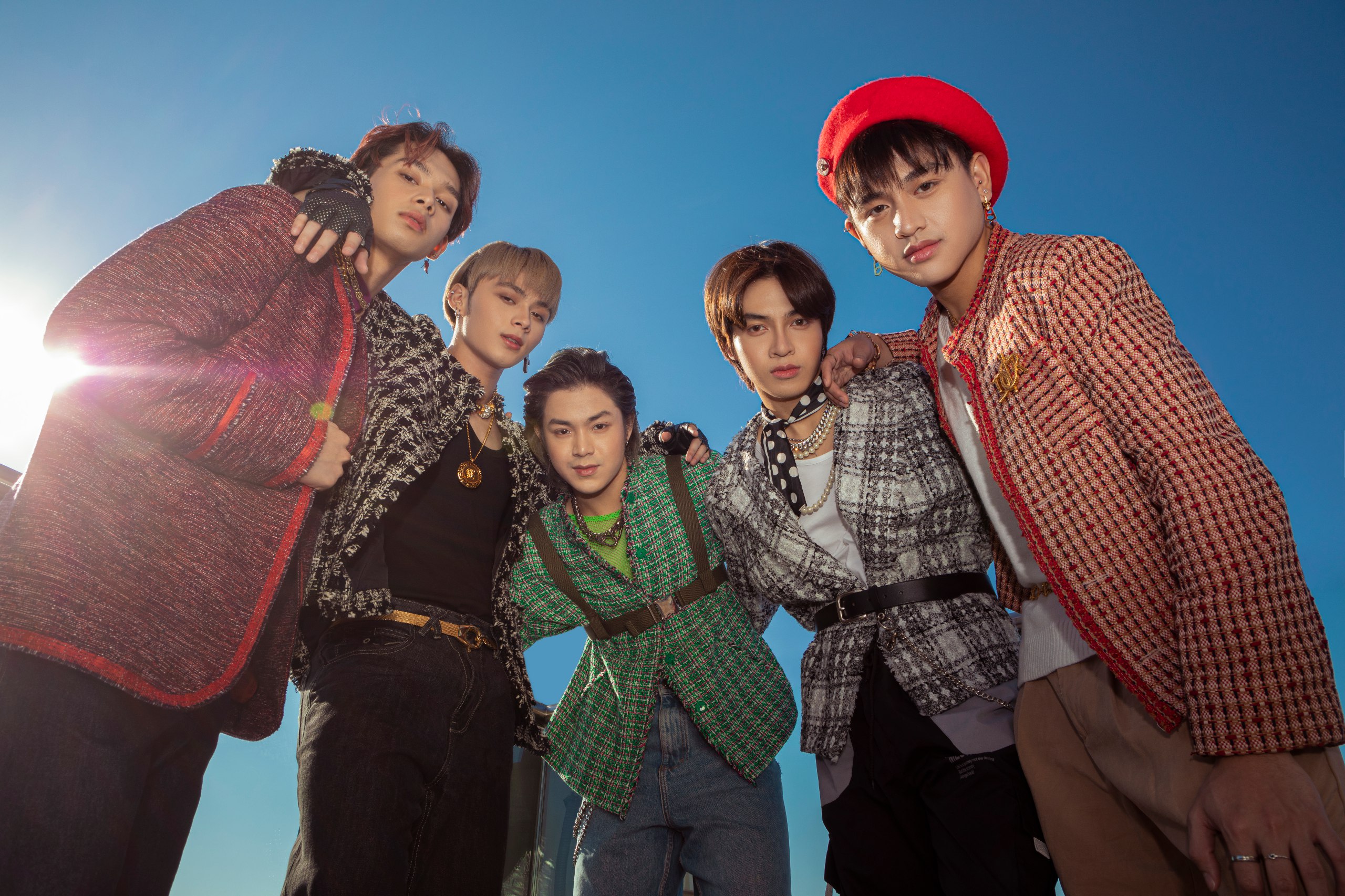
(L to R) Vince, Patrick, C13, Franz, and Sam
This is why when I saw VXON for the third time in their music label’s office, I had to do a double take.
Although donning their usual performance wardrobe of dark palettes and chains—and perfectly knowing who they individually are by now—it came off a little strange to meet them this time. They appear engrossed in their chill zone, pre-occupied by a NewJeans music video on the TV, and casually striking conversations with the label’s employees—a contrast to my noisy and fast-paced encounters with them prior this.
It’s not only from my point-of-view, though. If the group had their own monthly dump, it would surely be a quick supercut. Since their debut, the group graced TV guestings, collaborated with local artists like Jonathan Manalo and Zephanie, and even performed at the Expo 2020 Dubai, among other achievements.
This is why I begin my quick sit-down chat with them with, “Good to see you again,” explaining how we’ve met twice for photo-ops before, but they most likely don’t recall. For some reason, they quip in choir-like unison, “Hindi ah, naaalala ka po namin (No, we actually remember you).”
It evolves into a test on what my hair color was during those meet-ups—with Vince and Patrick trying to guess but failing—and then me getting the chance to ask about their whirlwind of a debut year. How have they changed as artists? Do they approach music differently now? Are they more conscious performers?
“Sobrang fired up po namin [last year], to the extent na ready kami mag-stunts, ready kami mag-run ng 1,000 runs in a month. Tapos ngayon po, parang mas naging critical na po kami, [like] sa details, and sa over-expressions din po,” Sam elaborates. “Kasi dati po, all out po dapat ’yong facial expressions, pero ngayon po mas kino-control namin siya. Para mas mag-improve ’yong visuals ng pinaka-choreography. Tapos siyempre ’yong pinagdaanan din po namin sa bawat stage, ’yong experience po doon, parang naging bala po sa giyera, [kaya] next time na mag-perform kami sa stage meron na kaming baon na experience.”
“Siyempre ’yong pinagdaanan din po namin sa bawat stage, ’yong experience po doon, parang naging bala po sa giyera, [kaya] next time na mag-perform kami sa stage meron na kaming baon na experience.”
(We were so fired up last year, to the extent that we were ready to do stunts, and do 1,000 runs in a month. But now, we’re more critical, like with details and over-expressions.)
(Before, the expressions should be all-out. But now, they’re more controlled, so the choreography’s visuals would improve. Then of course, with everything we go through in stages, they become like our bullets during war, so the next time we perform, we’re already armed with experience.)
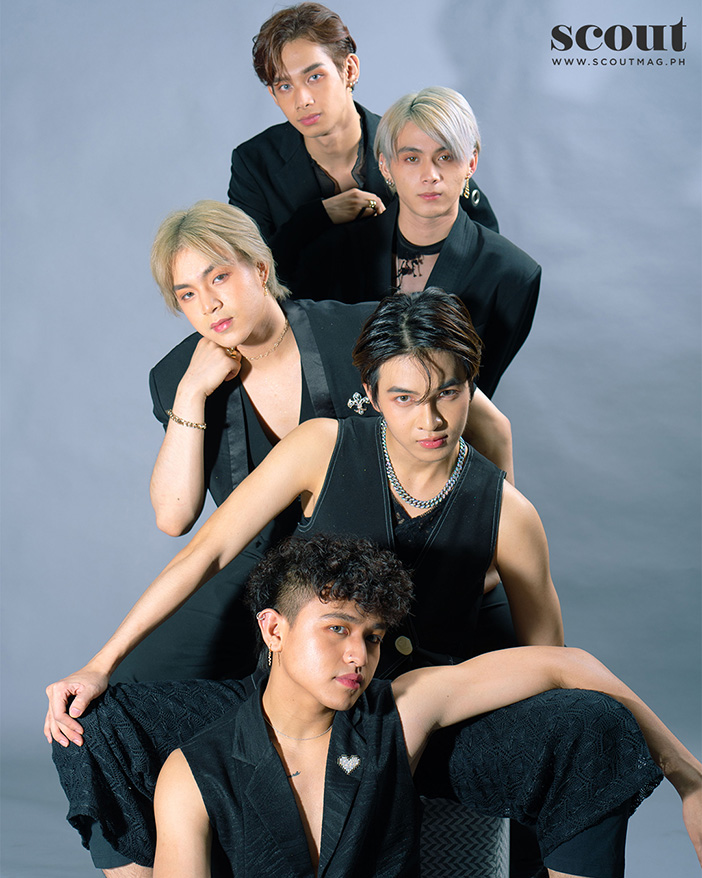
(Starting from the top) Vince, Patrick, C13, Franz, and Sam
Franz agrees that the change has been “drastic,” as they are now more nit-picky with details—from their vocals down to the dances. Showing excellence, quality, and relatability is their current priority.
Of course, one of the things that would amp this up is getting into the zone before facing the crowd. After all, the “ON” segment from their group name means that even if they’re nervous before a performance, they have to “turn on their switch” and be ready. As a way to recharge, they keep themselves awake and “pray before and after a performance,” Franz reveals.
The boys appear to consistently be united in their answers and little gestures. But from a reality show to the Voice Kids, each of them has specific origin stories, so keeping in harmony with each other may sound like a complex feat. But C13 insists that despite different backgrounds, things naturally fell into place on Day 1.
“Nag-[jibe] agad kami, nag-bond kami, and I think the reason why is ’yong common denominator namin is ’yong passion and parang fire when it comes to music and performing. Nagtutulungan kami. We build that bond, para makita talaga na this is us,” he says.
(We instantly jibed with each other, we bonded, and I think the reason why is our common denominator is the passion, and like, fire, when it comes to music and performing. We help each other. We build that bond, so others can see that this really is us.)
“We hear each other out, we talk it out, so I think communication is really important when it comes to a group. Because if kilala niyo ’yong isa’t isa through communication, mas madaling [mag-tulong-tulong] and [para ipakita ’yong] quality performance.”
Franz agrees that art is their unifying thread—and their differences in personality are actually strengths.
They wield this power through the simpler, quieter moments. “Kami po individually, meron po kaming…” he leads me to a brief pause and continues. “Insecurities. So to face them, ino-open up po namin siya sa isa’t isa and then to, parang, protect and lift up each other.”
(We open up to each other about our insecurities as a way of facing them. That’s a way to protect and lift each other up.)
He describes insecurities as their “ghosts,” which wrestle against their confidence—an important currency as an artist. “We hear each other out, we talk it out, so I think communication is really important when it comes to a group. Because if kilala niyo ’yong isa’t isa through communication, mas madaling [mag-tulong-tulong] and [para ipakita ’yong] quality performance.”
(If you know each other well through communication, it’s easier to help each other out, which reflects quality performance.)
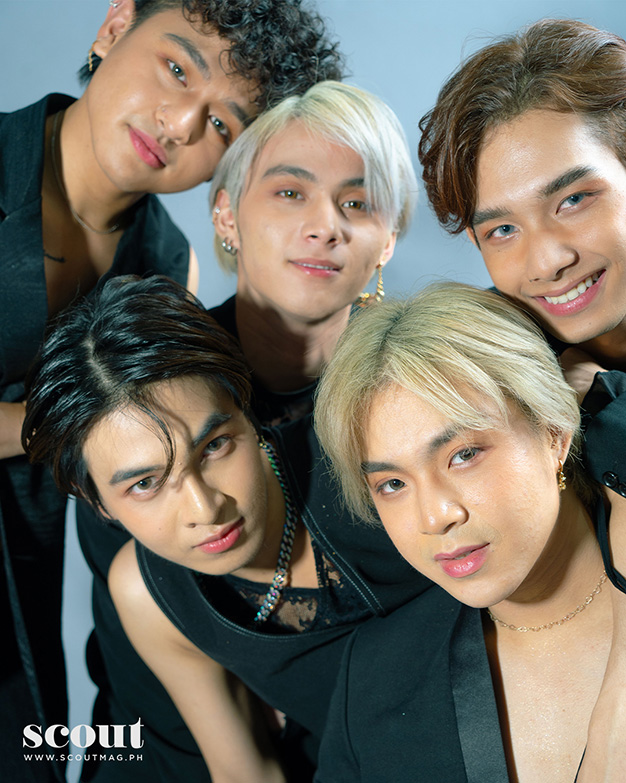
(First row, from the left) Sam, Patrick, Vince (Second row) Franz and C13
Sam adds, “’Yon po ’yong mahalaga. Kapag kahit ano pa ’yong sabihin ng outside, externally, ’yong internal po lagi ’yong priority. Kaya kapag nagpe-perform po kami, kami muna, circle muna namin. Tapos kapag na-nurture na namin ’yong inner circle na ’yon mas mag-re-reflect, mas makikita ng tao na nag-e-enjoy kami sa stage. Lagi pong sinasabi ng manager namin, celebrate—kasi nagpe-perform kami sa stage. Always celebrate.”
(That’s what’s important. Because whatever opinions we receive externally, we always prioritize what happens internally. So when we perform, we focus on our own circle first. Then once that inner circle is nurtured, it will reflect on the outside that we’re enjoying ourselves onstage. Our manager always says we should celebrate—because we perform onstage. Always celebrate.)
For Vince, navigating with confidence is tricky for its unpredictability; no one knows what could unfold while facing the audience. But the least they could do is pull themselves to stay on the same page. “‘Ito ’yong gusto kong ipakita, ito ’yong gusto kong sabihin sa mga tao.’ Parang ’yon ’yong nagiging mindset namin before performing, to gain confidence.”
(‘This is what we want to show, this is what we want to say.’ That’s what our mindset is like before performing, to gain confidence.)
“‘Ito ’yong gusto kong ipakita, ito ’yong gusto kong sabihin sa mga tao.’ Parang ’yon ’yong nagiging mindset namin before performing, to gain confidence.”
I can only imagine that confidence comes off extra exigent for the group, given their label: The Monster Rookies of P-pop.
Whenever we encounter monsters in fiction, there’s always an air of mystery that wraps around these creatures. But no matter how curious we are, we wouldn’t dare get near them. There’s a certain kind of power they hold that would drive off unwanted forces—and I imagine how challenging it must be for the group to morph into this kind of imagery, moreso as a fresh addition to the P-pop industry.
But it began right off the bat. After all, their Spotify page says they’re “ready to unleash the musical beasts within.” Their discography’s themes usually explore concepts of taking control and maximizing potential, and are further amplified by how they sound. Debut single “The Beast” is characterized by threatening vocals—and the “flaming desire” lyric seems to find a sequel in “Fiyaah,” which can double as a villain origin story’s OST. Early this year, this territory gets elevated with the suspenseful “Breaking Bad,” in which C13 says is a way to showcase “the members’ strengths.”
Franz also shared, “We’re very happy na all of us, kaming mga members ay very involved doon po sa creative process ng song. We decide on the melodies, the lyrics, instruments, and [its other] elements.”
However, I sometimes see the concept of aggression and power get in contradiction with softness and vulnerability. Does VXON think the same way? For them, how much is vulnerability important—especially in songwriting?
It plays a vital role for Vince, who seems to view it as a mirror. “Gusto makita ng mga tao and masabayan ’yong journey mo [as an artist]. Then [from] that, tuloy-tuloy na ’yong support, or yung pagiging attached mo sa isang artist.”
(People want to witness and go along with your journey as an artist. Then from that, the support or one’s attachment to an artist continues.)
Sam equates vulnerability with removing pretension in exuding emotions. “Lalo na po ’yong gumagawa ka ng song, parang kung magpe-pretend ka na brokenhearted… mas maganda sana kung brokenhearted ka talaga, vulnerable ka talaga, tapos ginawa mo ’yong song. It reveals the personality, the heart of the artist.”
(Especially with you make a song, if you only pretend to be brokenhearted… it’s better if you really are brokenhearted, you really are vulnerable, then you make the song.)
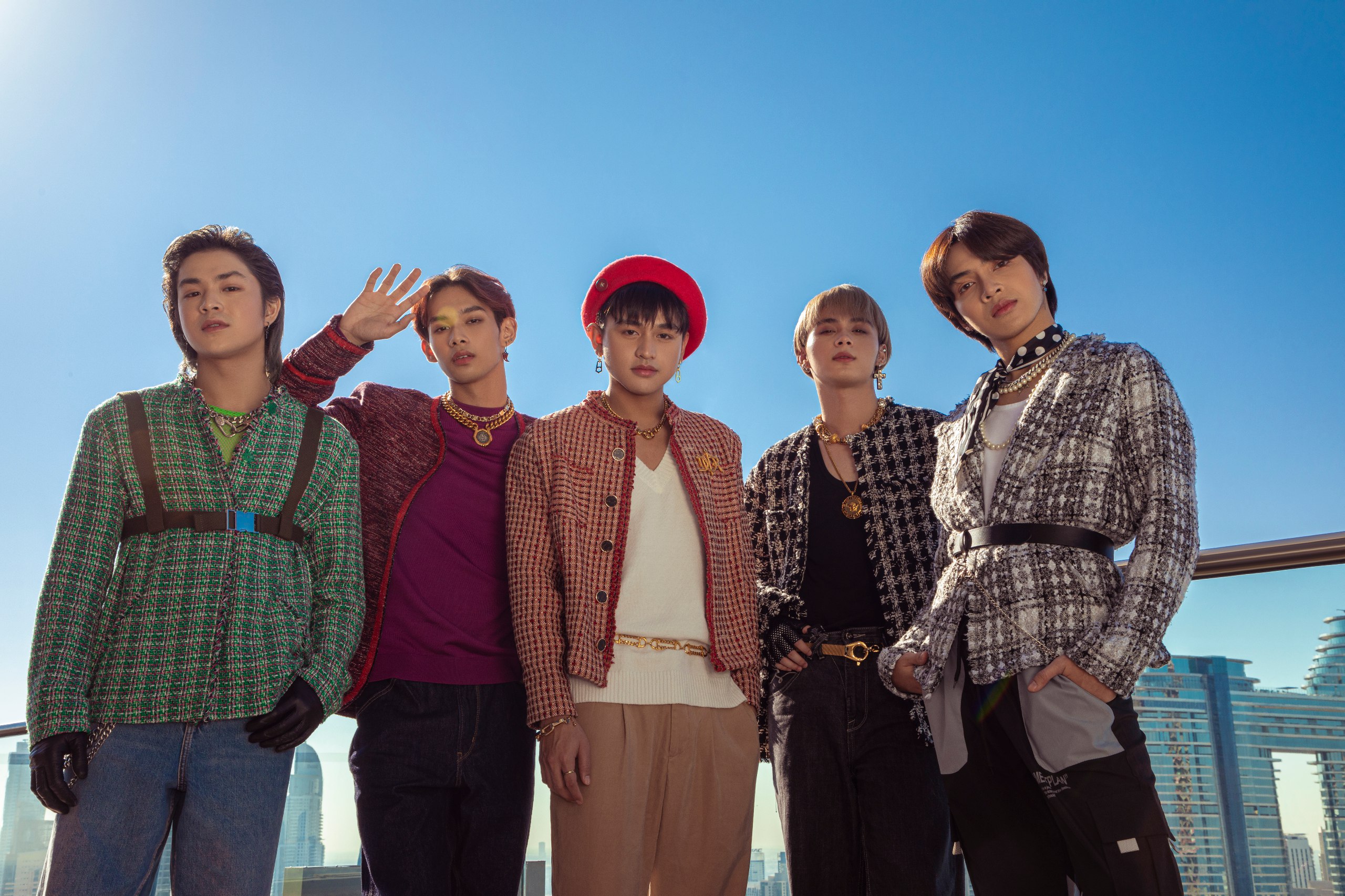
(L to R) C13, Vince, Sam, Patrick, and Franz
C13 also stresses that our idols themselves carry their own vulnerability. Once the fans see that they’re just as normal as everyone else, that’s where “relatability, sympathy, and connection” come in.
And with regard to the one-dimensional meaning of a monster, Franz begs to differ. “When it comes to our moniker naman po which is the ‘Monsters of P-pop,’ siguro po, ’yong ‘monsters’ po [pumapasok] when it comes to performing. But also, huwag din po nating kalimutan na monsters have their vulnerability and their weaknesses. And siguro kami po this year, we’re not afraid to show our vulnerable side. Because to show vulnerability is being brave as well.”
“Huwag din po nating kalimutan na monsters have their vulnerability and their weaknesses. And siguro kami po this year, we’re not afraid to show our vulnerable side. Because to show vulnerability is being brave as well.”
(When it comes to our moniker ‘Monsters of P-pop,’ maybe the ‘monsters’ come in when it comes to performing. But also, let’s not forget that monsters have their vulnerability and their weaknesses. And maybe this year, we’re not afraid to show our vulnerable side. Because to show vulnerability is being brave as well.)
The tip of this agenda’s iceberg can be found in their latest release “Pretty Please”—a peek into a person’s overthinking mind, hyperconsciousness, and frustration in being hung up on the past. It traverses a much more vulnerable lyricism (Puwede ba akong pagbigyan? / ‘Di mo na ba ako mahal? / Pick up your phone when I dial / ‘Di ka man lang nagsabi ng goodbye) and a chiller soundscape, but without losing VXON’s brand of grit and murky atmosphere. It almost plays like a shameless confession—something unexpected from “monsters” who might dodge any opportunity of openness.
Meanwhile, with VXON’s present connections, the one they have with Vixies (whom Franz reveals would book flights just to catch their shows) hold so much depth.
In this relationship, C13 reveals the biggest thing he learned: “We play an important role in other people’s lives.”
He softly narrates, “Nababasa namin on Twitter, or naririnig namin personally na sinasabi nila na, ‘Kung hindi dahil sa inyo VXON, hindi ko alam kung ano nang nangyari sa ‘kin or kung nasaan na ako ngayon.’ Or gusto na raw nila i-end ’yong life nila, or hirap na hirap na sila. So hearing that, gusto talaga naming mas pagbutihin pa, mag-work even harder para mapasaya lang ’yong Vixies. Personally, music changed my life. And I think lahat naman kami, or karamihan ng tao. So that’s one [of the things] rin kung bakit nagpupursige kami in creating music.”
(We read on Twitter or we personally hear stories about our fans saying, ‘If it weren’t for VXON, I don’t know what would have happened to me or where I would be now.’ Or they’d tell us that they wanted their life to end, or they’re deeply struggling. So hearing that, I really want for us to do even better, work harder just to make the Vixies happy. Personally, music changed my life. And I think it’s the same for all of us and most people. So that’s one [of the things] also why we’re persistent in creating music.)
“Nababasa namin on Twitter, or naririnig namin personally na sinasabi nila na, ‘Kung hindi dahil sa inyo VXON, hindi ko alam kung ano nang nangyari sa ‘kin or kung nasaan na ako ngayon.”
Even in pop culture recommendations, VXON’s go-tos seem to reflect their values. Making the room laugh with his initial choice “White Chicks,” Patrick then goes into serious mode, mentioning family drama “Seven Sundays.” He unpacks the story with enthusiasm, “Kumbaga ’yong past po nila, may mga problem po sila individually. Pero at the end of the day, sila-sila pa rin ’yong nagtutulungan no matter what happens.”
(In the past, they individually had problems. But at the end of the day, they only have each other.)
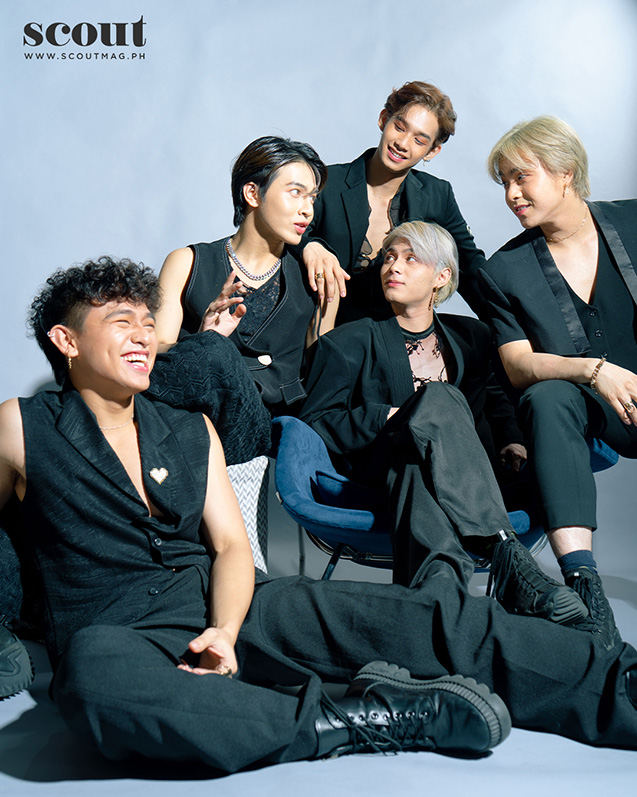
(From L to R) Sam, Franz, Vince, Patrick, and C13
For almost a minute, the other members try to distract him while he rummages his thoughts for a music rec, until he finally reveals rapper-songwriter Kiyo’s discography as something he can relate to.
Meanwhile, Franz (a Swiftie and “1989” stan) and Vince both highlight the sense of community and importance of family as they mention Disney’s “Brave” and “Encanto,” respectively. “You don’t have to have superpowers to be unique. Because you yourself [are] unique,” tells Vince.
The significance of identity also takes the throne in C13’s movie rec, Studio Ghibli’s “Spirited Away,” which taught him to never forget who he is.
And for some reason, it finds a connection with 2023 fantasy adventure “The Magician’s Elephant,” Sam’s pick. “It’s about believing—kahit ilang imposibleng task na sabihin sa ‘yo, pero ‘pag naniwala ka na kaya mo, and [you do it] with heart, magagawa mo.”
(It’s about to believing—no matter how many impossible tasks get thrown at you, but if you believe that you can do it, and you do it with heart, you can do it.)
***
After our chat, Monster Rookies of P-pop C13, Sam, Patrick, Vince, and Franz randomly find themselves in a conversation about the LRT monster of “Shake, Rattle and Roll 8” with their management. In a Venn diagram, these two types of monsters are definitely not the same.
Read more:
P-pop group Yes my Love follows their ‘rhythm’ to make their dream tour happen
The P-pop herstory: A retrospective look into the P-pop girl group transformation
For P-pop artists, fans hold the future of the genre
Shoot photos by JT Fernandez, edited by Mikey Yabut
Art direction by Yel Sayo
Press photos courtesy of UMG Philippines















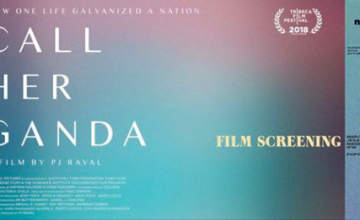
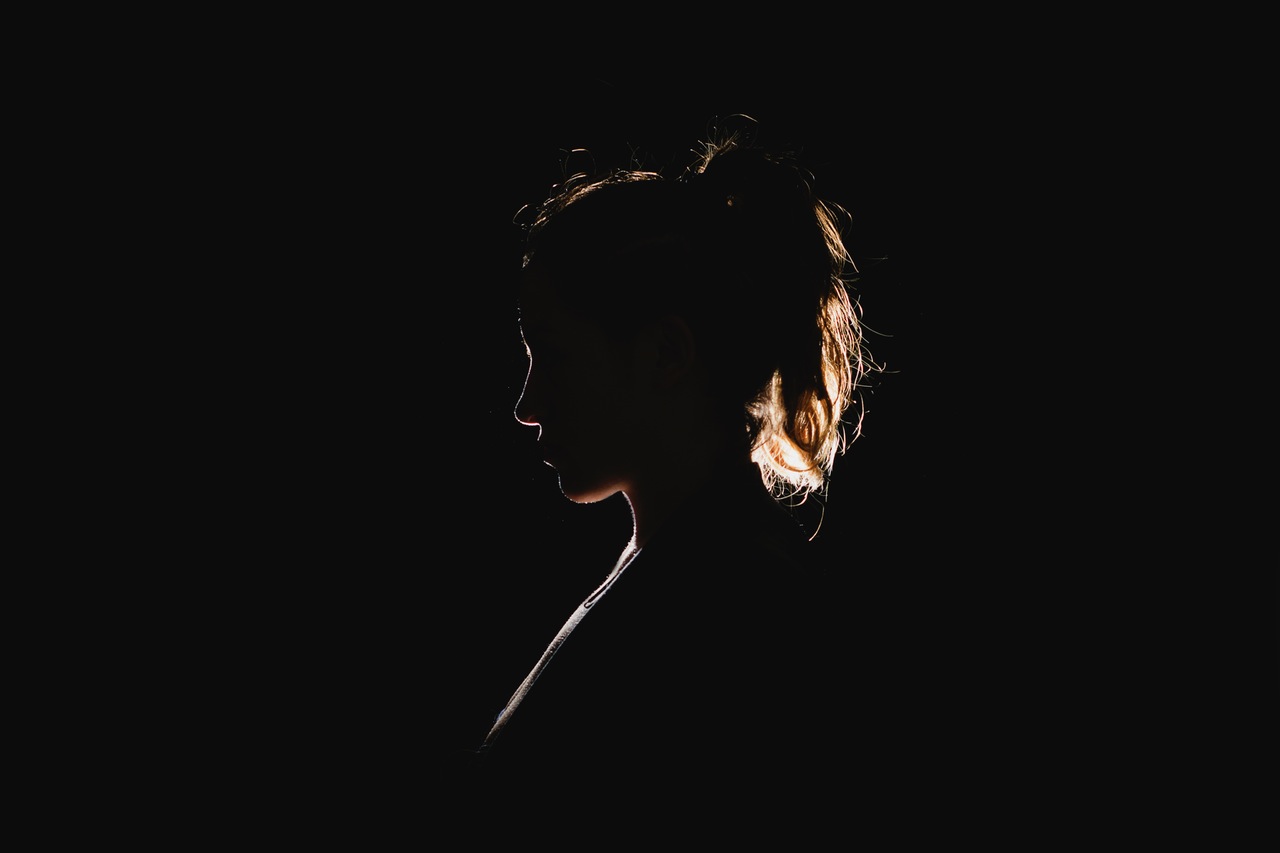
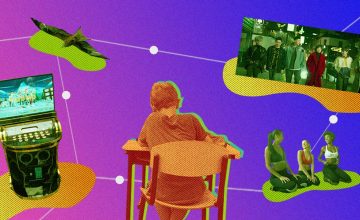






Comments